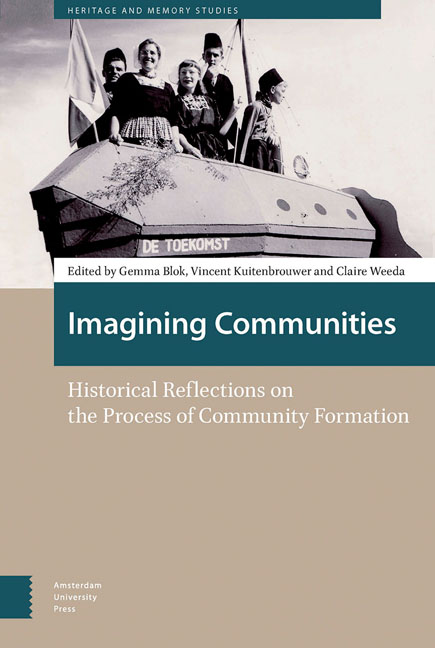Book contents
- Frontmatter
- Contents
- List of Figures
- Introduction
- 1 Meanwhile in Messianic Time: Imagining the Medieval Nation in Time and Space and English Drinking Rituals
- 2 Diverse Origins and Shared Circumstances: European Settler Identity Formation in the Seventeenth-Century Plantation Colony of Suriname
- 3 Imagining Europe: The Peace of Ryswick (1697) and the Rise of European Consciousness
- 4 Gypsy Music and the Fashioning of the National Community
- 5 ‘Tired, Worried and Overworked’: An International Imagined Community of Nervous Sufferers in Medical Advertisements, 1900-1920
- 6 ‘From Heart to Heart’: Colonial Radio and the Dutch Imagined Community in the 1920s
- 7 Indonesian Nationalism in the Netherlands, 1920s-1930s: Long-Distance Internationalism of Elite Pilgrims in Homogeneous, Empty Time
- 8 Time, Rhythm and Ritual: Imagined Communities in L’espoir (1937) and Les sept couleurs (1939)
- 9 Stamverwantschap and the Imagination of a White, Transnational Community: The 1952 Celebrations of the Jan van Riebeeck Tercentenary in the Netherlands and South Africa
- 10 ‘L’Oranie Cycliste, une grande famille’: Recycling Identities and the Pieds-Noirs Communitas, 1976-2016
- 11 Remembering and Imagining the National Past: Public Service Television Drama and the Construction of a Flemish Nation, 1953-1989
- Index
2 - Diverse Origins and Shared Circumstances: European Settler Identity Formation in the Seventeenth-Century Plantation Colony of Suriname
Published online by Cambridge University Press: 11 December 2020
- Frontmatter
- Contents
- List of Figures
- Introduction
- 1 Meanwhile in Messianic Time: Imagining the Medieval Nation in Time and Space and English Drinking Rituals
- 2 Diverse Origins and Shared Circumstances: European Settler Identity Formation in the Seventeenth-Century Plantation Colony of Suriname
- 3 Imagining Europe: The Peace of Ryswick (1697) and the Rise of European Consciousness
- 4 Gypsy Music and the Fashioning of the National Community
- 5 ‘Tired, Worried and Overworked’: An International Imagined Community of Nervous Sufferers in Medical Advertisements, 1900-1920
- 6 ‘From Heart to Heart’: Colonial Radio and the Dutch Imagined Community in the 1920s
- 7 Indonesian Nationalism in the Netherlands, 1920s-1930s: Long-Distance Internationalism of Elite Pilgrims in Homogeneous, Empty Time
- 8 Time, Rhythm and Ritual: Imagined Communities in L’espoir (1937) and Les sept couleurs (1939)
- 9 Stamverwantschap and the Imagination of a White, Transnational Community: The 1952 Celebrations of the Jan van Riebeeck Tercentenary in the Netherlands and South Africa
- 10 ‘L’Oranie Cycliste, une grande famille’: Recycling Identities and the Pieds-Noirs Communitas, 1976-2016
- 11 Remembering and Imagining the National Past: Public Service Television Drama and the Construction of a Flemish Nation, 1953-1989
- Index
Summary
Abstract
This chapter focuses on the way migration to the colony of Suriname transformed the identities of European migrants. They did not shed their old identity, but rather gained an additional identity, as they became part of a community of European settlers of Suriname. The European settler community that developed was based on shared material interests and fear for the (enslaved) Amerindians and Africans, rather than on cultural similarities. This chapter questions the role of print media in the formation of imagined communities. European migrants in Suriname confirmed their old identities through correspondence with the Dutch Republic, and their new European settler identity grew through word of mouth and written communications within the colony.
Keywords:Suriname, prize papers, print media, Atlantic history, colonization, imagined community
In May 1674, Wouter Assueros and Jacob Boldersen requested the Dutch province of Zeeland to finance their passage to the province's plantation colony of Suriname. They emphasized that they were both born in the province’s capital, Middelburg, and asked their province's support so they could set sail for the Caribbean sugar colony, where they wanted to contribute to the colony's development and ‘seek [their] fortune’. The state of war in the Dutch Republic had wreaked so much havoc that they wanted to spend at least several years in Suriname. The province of Zeeland readily agreed to pay for their passage. The reasons for these men to leave the Dutch Republic are illustrative for the motivations of hundreds of people whose travels to Suriname the States of Zeeland paid for in the late 1660s and 1670s. Throughout the Dutch Republic, Zeeland had informed potential migrants in print of Suriname's attractions by publishing positive reports to attract new settlers. Thus the migrants went to Suriname with more or less similar expectations, even though they came from different parts of the United Provinces. While the reality in Suriname generally did not meet those expectations, the new environment profoundly changed their lives and shaped their identities.
The early migration to Suriname and availability of personal correspondence of migrants in the 1670s allows us to research the development of a young colonial community in a distant land. To analyse the way migrants in the Americas developed their new worldview, the ideas of Benedict Anderson provide a valuable point of reference.
- Type
- Chapter
- Information
- Imagining CommunitiesHistorical Reflections on the Process of Community Formation, pp. 41 - 58Publisher: Amsterdam University PressPrint publication year: 2018



